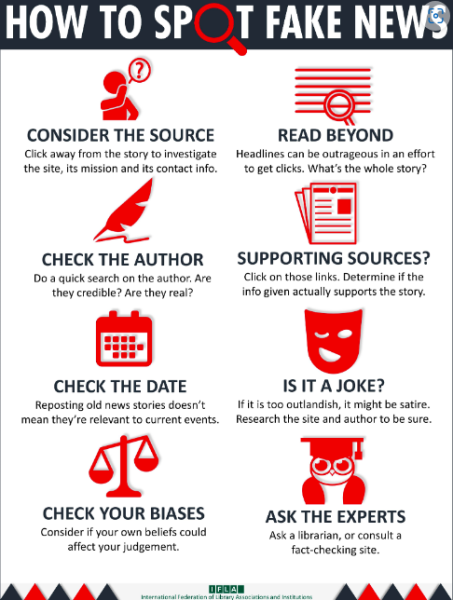
Above is a photo from the International Federation of Library Associations and Institutions. This exact image is available at my local library, and probably many others across Canada as well. It’s meant as a rough guide for filtering out information.
While it presumably is targeted at books, the same guidelines are valid for podcasts, articles, videos and other content. And there are worthwhile things to ask.
- Are there any supporting sources to make the claims?
- Is the title “clickbait”, or does it accurately represent the content
- Is it satire? If the claims made are overly dramatic, the author may be trying to create humourous work.
- Who wrote it, and why? Are there any obvious conflicts of interest?
- Who can a person check with to verify the information?
- Will biases be an issue in judging it objectively
- Is the information current or outdated?
No one needs to point out how badly “ask the experts” has gone lately. Nonetheless, it can be a starting point for getting information on a topic.
Note: This isn’t meant at a specific person or group. Rather, it’s a pattern that has become a lot more noticeable over the last few years.
While many people have become proficient at spotting Government deception and propaganda, they either overlook or ignore it in the alternative media spheres. Of course, the reverse is also true for the normies. And examples?
(1) Some who dismissed Government fear mongering around this so-called “pandemic” will not look carefully into topics such as microchipping vaccines, DNA modification, gain of function, lab leaks, or bioweapons. Any dramatic claims deserve skepticism, regardless of the source.
(2) On a related note: there have been some who (rightly) question whether CV tests are accurate based on current methods. However, they will just take for granted that other viruses can be tested for using that same technology. We want authors who are logically consistent.
(3) Some of the larger political alternative voices will do a great job researching candidates and parties they don’t like, while making excuses for those they support. If they have a dog in the fight, then they can never be fully trusted.
(4) In a world where views and advertising dollars matter, catching attention is important. However, that’s not always the best option if the content doesn’t warrant sensationalism.
(5) While Government plants within the media are often easy to spot, “alternative” voices come out of nowhere and instantly gain huge followings. Such individuals do so despite addressing topics that are normally censored, or while not offering anything insightful. Similarly, if the content frequently borders on, or engages in outright Fed-posting, be wary.
(6) Lack of curiosity should always be viewed as a red flag. If a piece touches on really important issues, but only at a surface level — with no follow up — one should ask why. Rabbit holes are a fun, albeit exhausting, way to shake strongly held views.
These are just a few things that have come up in the alt-media landscape, and not just the Canadian scene. All media should be scrutinized, regardless of whether it has the slant and leanings that are preferred.
A question that comes up is who should the public be following. The answer is no one. Ideally, the best populace is one that’s full of inquisitive and resourceful people. Yes, research is time consuming, but there’s no shortcut to becoming educated. The alternative is to sit back and hopefully trust the right outlet. That seems to be a poor plan.
True, there’s no way to not view published media at all, but just realize that there will be gaps in what’s presented. If nothing else, different perspectives can at least draw attention to flaws and errors.
A little discernment can go a long way….
